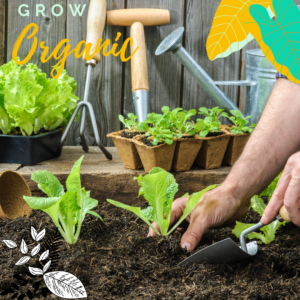7 Reasons to Grow Your own organic vegetable garden
During the last few decades there has been a change towards mechanization and homogenization of farming. This type of farming relies heavily on the use of pesticides, additives, herbicides, synthetic fertilizers, hormones, and mass-production techniques. All this is clearly affecting mankind’s health, and new diseases are spreading rapidly amongst humans and animals.
The World Health Organization produces reports to show how the use of chemicals and other products on food, coupled with the manufacturing processes involved, are actually a threat to our health. Glyphosate anyone? This deserves it’s very own post but in the meantime, if you want to get into the nitty-gritty of this awful chemical and how it affects our bodies and our environment listen to this podcast:
If you have space for a few pots or even a small piece of land, grow your own! It is probably one of the best decisions you will ever make.
- Your veggies will be free from additives, you will know from start to finish how and what is used on your vegetables. Research by organic food associations has shown that additives in our food can cause heart diseases, osteoporosis, migraines, and even hyperactivity.
- There will be no pesticides or synthetic fertilizers used. These chemical products are applied to obtain crops all the time regardless of plagues or weather conditions and they affect the quality, nutrient content, and health of the vegetables. Besides, pesticides are usually poisonous to humans in any amount, and have you ever seen an ingredient list on those lettuce greens at the store, telling you exactly how they were grown, processed, and cared for? *I know, that last sentence reminds me of a hilarious Portlandia episode where a couple is drilling their waitress on where their chicken came from.* It’s funny – but in all seriousness, this stuff is important and affects you on a level you may not even be aware of.
- Your vegetables will not be genetically modified (GM). Antibiotics, drugs, and hormones are used on vegetables to grow more and larger ones. One of the consequences of this practice are vegetables which look all the same and are usually tasteless. Besides, we end up consuming the hormones that have been used on the vegetables, with the potential risks for our health.
- Eating your own organic vegetables is healthier, bottom line. They will not contain any of the products or chemicals named above, and they will be much more natural than any ones you would find at the supermarket. Your health will not be at risk because you will then know that nothing has been added to your vegetables. Not to mention the health benefits of gardening, being outdoors with your hands in the dirt, and caring for your food from start to finish.
- Your own organic vegetables will be so much tastier, and more nutrient-dense. The use of pesticides, synthetic fertilizers, hormones, and antibiotics makes vegetables grow unnaturally and strip the taste and nutrients away from them. With organic vegetables, your cooking will be enhanced as their flavor will show fully.
- Organic farming is friendly to the environment. Because you won’t use pesticides or other equally harming products on your vegetables, you will not damage the soil or the air with the chemical components.
- When you grow your own organic vegetables you are contributing to your own self-sustainability and the sustainability of the planet! Small communities have been founded where members exchange products that they grow naturally, thus contributing to creating a friendly and better place for us all.
In the end, eating organic means that we don’t add anything else to our foods other than what they would naturally have. As you can guess, additives, fertilizers, pesticides, or hormones are not components of naturally grown food, and disrupt the ecosystem of your land, your immediate environment and your body. To better care for the health of you and your family, grow your own!
If you aren’t into doing this on your own, don’t have the time, space, or the energy – reach out to a local farm, look into farmer’s markets and support small businesses, farmers, and your local community all at the same time. It’s a win-win all around.
If you need a little inspiration you should check out The Biggest Little Farm – one of my all-time favorite documentaries.
Happy gardening!
Until next time ~
Erin



